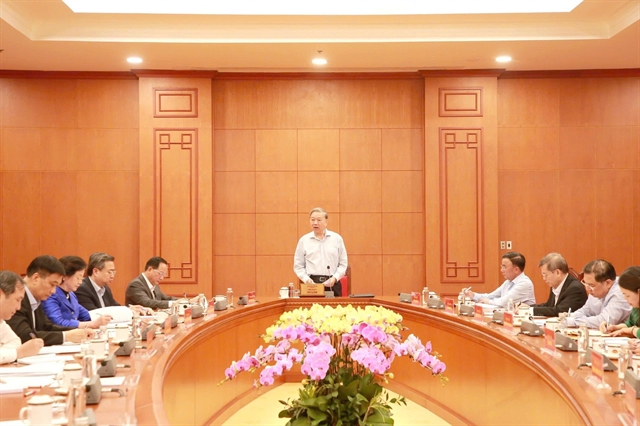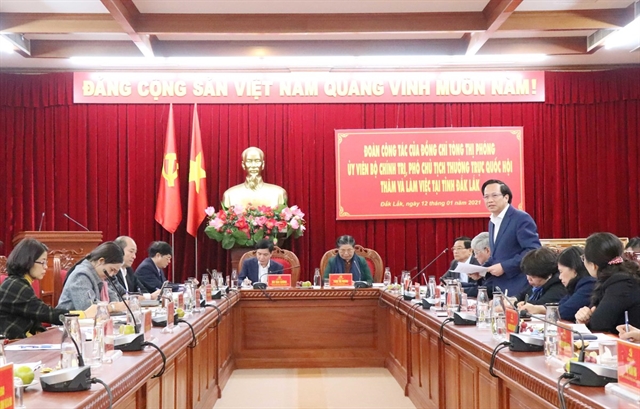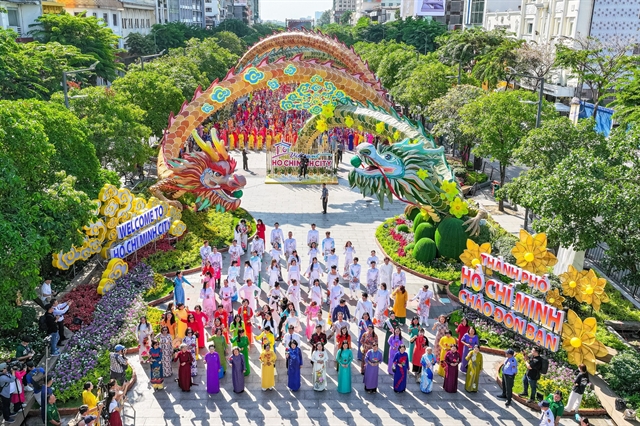 Politics & Law
Politics & Law

While the lives of people in ethnic minority and mountainous areas have improved over the years, efforts must be made to preserve their unique cultural identities, a top official has said.

|
| Tòng Thị Phóng, vice chairman of National Assembly, at a conference in Đắk Lắk Province yesterday.— VNA/VNS Photo |
ĐẮK LẮK — While the lives of people in ethnic minority and mountainous areas have improved over the years, efforts must be made to preserve their unique cultural identities, a top official has said.
Over the years, the Party and the State have paid special attention to development in ethnic minority and mountainous areas, said Tòng Thị Phóng, vice chairman of National Assembly, at a conference in Đắk Lắk Province yesterday.
These efforts have improved the lives of people in such areas, strengthened national security and defence and raised the political position of ethnic minorities, she said.
However, she said, these areas are still in difficult conditions and there are big gaps in socio-economic development between regions.
Development poses many challenges for ethnic minority areas, especially employment, poverty, environmental protection and protecting cultural spaces aimed to preserve the unique traditional cultural values of ethnic groups, she said.
Phóng made the statement at a conference on socio-economic development in ethnic minority and mountainous areas in the Central Highlands and central coastal provinces.
She emphasised that the Central Highlands and central coastal have a particularly important position in terms of socio-economic, defence, security and environment for the country.
According to the NA Vice chairwoman, the approval of the Master Plan on socio-economic development in ethnic minority and mountainous areas in 2021-2030 and the passing of a resolution on the national target programme on socio-economic development in ethnic minority and mountainous areas during 2021-30 are very important.
“It is a driving force for ethnic minority people in the cause of poverty reduction, sustainable socio-economic development in harmony with the overall development of the country,” Phóng said.
The National Assembly on June 19 passed a resolution on the national target programme on socio-economic development in ethnic minority and mountainous areas during 2021-30, aimed at improving the livelihoods of ethnic minority groups.
The programme sets a target of doubling the income per capita of people from ethnic minority groups in the next five years compared to the current rate from VNĐ1.1 million to VNĐ2.2 million ($47-95) per month per person.
By 2025, it aims to improve infrastructure, create jobs and address the pressing issues of more than 16,100 households from ethnic minority groups and disadvantaged ethnic groups.
By 2030, the income per capita of people from ethnic minority groups is hoped to be raised to half of the national average. The programme also aims to cut the number of poor households to less than 10 per cent of the total number of households, with no hamlets or communes in extremely difficult conditions and 70 per cent of communes in ethnic minority and mountainous areas meeting new rural area criteria.
The NA vice chairwoman suggested a number of solutions for ethnic minorities in the Central Highlands and coastal central provinces to develop rapidly and sustainably.
Issues related to land and employment should be solved to enhance ethnic minorities' incomes, she said, adding that cultural and education development should prioritise ethnic minority people.
The NA vice chairwoman said special policies dedicated to improving education among minorities must be issued.
She also mentioned the need to ensure they enjoy free healthcare services.
It is essential to focus on training human resources for ethnic minority and mountainous regions, maintaining a certain rate of ethnic minorities among cadres in those localities.
Participants at the conference discussed several issues including how to secure resources and supervise State budget investment for the programme. The perseveration of traditional cultural values of ethnic minority people as well as how to deal with illegal migration were also discussed at the meeting.— VNS




